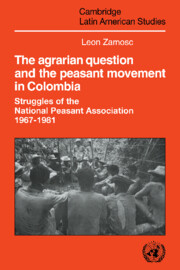 The Agrarian Question and the Peasant Movement in Colombia
The Agrarian Question and the Peasant Movement in Colombia Book contents
- Frontmatter
- Contents
- List of tables, figures, and maps
- Foreword by Tedor Shanin
- Foreword by UNRISD
- Acknowledgments
- List of abbreviations
- Map 1 Republic of Colombia
- Introduction
- 1 The agrarian question in Colombia
- 2 Reformism and the beginnings of the peasant movement
- 3 The radicalization of ANUC and the great waves of land invasions
- 4 Counterreform
- 5 The contradictory influences of peasant politicization
- 6 Concessions and repressive escalation
- 7 The new occupational alternatives and the issue of the rural proletariat
- 8 Partial repeasantization and the question of the new peasant settlements
- 9 Final crisis and clientelist regression of ANUC
- 10 Overview and final remarks
- Notes
- Bibliography
- Index
- Cambridge Latin American Studies
Foreword by Tedor Shanin
Published online by Cambridge University Press: 10 October 2009
- Frontmatter
- Contents
- List of tables, figures, and maps
- Foreword by Tedor Shanin
- Foreword by UNRISD
- Acknowledgments
- List of abbreviations
- Map 1 Republic of Colombia
- Introduction
- 1 The agrarian question in Colombia
- 2 Reformism and the beginnings of the peasant movement
- 3 The radicalization of ANUC and the great waves of land invasions
- 4 Counterreform
- 5 The contradictory influences of peasant politicization
- 6 Concessions and repressive escalation
- 7 The new occupational alternatives and the issue of the rural proletariat
- 8 Partial repeasantization and the question of the new peasant settlements
- 9 Final crisis and clientelist regression of ANUC
- 10 Overview and final remarks
- Notes
- Bibliography
- Index
- Cambridge Latin American Studies
Summary
There have been few good histories of peasant movements. The nature of the evidence is partly to blame for this. Peasants were mostly illiterate, and the few literates who stood by them or led them too often died a martyr's death. With the participants' own tale seldom recorded, what has been left is silence, or else the chronicles of the victors over the peasants, whose evidence is as twisted and indecent as a snapshot of victims by their executioners.
This silence and the biases of evidence are still with us as far as the history of the present – a sociology of the contemporary peasants – is concerned. In our own communication-saturated society, peasants still seldom tell their own tale, and their leaders still die violently the world over. And not for the plebeian rebels and activists are the cushioned émigré life or the foreign universities where most of the opposition's memoirs and tracts are nowadays written.
But it is not simply a matter of evidence. If beauty lies in the eyes of the beholder, so do the mystification and the lie. Those who write about peasants are as a rule outsiders to them. It is not only that they usually meet peasants for a moment and a glimpse, or not at all; more important is that they fail to acknowledge the peasants' way of life as different, yet reasonable on its own terms, and as changing but with different alternatives.
- Type
- Chapter
- Information
- The Agrarian Question and the Peasant Movement in ColombiaStruggles of the National Peasant Association, 1967–1981, pp. xi - xivPublisher: Cambridge University PressPrint publication year: 1986


